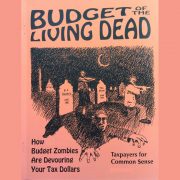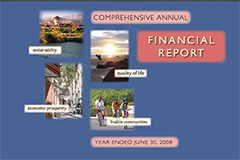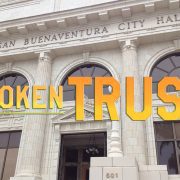Failed Tax Initiatives Force California To Look For Money Elsewhere

“Reflect how you are to govern a people who think they ought to be free …Your scheme yields no revenue; it yields nothing but discontent, disorder, disobedience; and such is the state of America, that after wading up to your eyes in blood, you could only end just where you begun; that is, to tax where there is no revenue to be found…”
—Edmund Burke
THE FAILED TAX INITIATIVES
[WHAT IT MEANS FOR VENTURA]
California voters sent a message in the last election about a state government out of control, and out of touch. By rejecting the political establishment’s $16 billion in higher taxes, spending gimmickry and more borrowing, the voters got it right. They are willing to accept the consequences of today’s economic realities notwithstanding the Governor’s threats of releasing criminals, firing teachers, firing public safety personnel, etc. The citizens have made it clear that it is time that our “elected officials” and the entrenched state bureaucracy faced the same spending limitations that this recession is imposing on everyone else.
Teachers unions, government funded business leaders, prison guards and everyone else, enjoying the good life at the public tax trough, outspent initiative opponents by six-to-one and LOST. The voters decided that as painful as these cuts may be, the alternative of letting the state’s tax-and-spend machine continue was worse.
THE STATE SCRAMBLES TO FIND OTHER REVENUE
The response so far from Sacramento is typically short-sighted. To circumvent the apparent will of the voting public our good governor, legislators and public-worker unions are now pursuing plan B: a federal bailout or plan C: take real property taxes from the cities. The Governor was seen scrounging in Washington a month ago, along side Mr. Gettelfinger of General Motors, sounding like a Detroit auto executive, declaring: “We need assistance.” in the form of a federal guarantee on California’s next $6 billion bond offering. Moreover, just who will repay the bonds Governor?
But a federal bailout is an injustice to the residents of other states, especially those that run their governments responsibly. Why should taxpayers in other states pay for California’s incompetence? But even worse, we know that once the Federal Government gives you money they then feel they have the right to tell you what you can or cannot do. It is not inconceivable to expect that the Obama Administration’s price of a bailout would be a demand that California remove its requirement for a two-thirds legislative majority to pass a tax increase; or, repeal of the Proposition 13 property tax limitations. Once you make a pact with the devil you lose all freedom of choice.
Likewise, cities should not have to pay for the incompetence of state government or that of other cities. Taking real property taxes from each City and County is an injustice to the residents of each community who pay those taxes for the benefit of their community. It is disingenuous for the state legislature to “borrow” [steal is a more realistic term, albeit radical] each cities tax money, because the state “needs” the money to balance their budget, when they know that they will have no money to pay it back.
SOLUTIONS
Some want to throw all of the rascals out on their ear, some are leaving the state, some want a constitutional convention but most are just plain disgusted, not understanding what happens when that elected official gets Sacromentized.
Thirty years ago this November, the not so distant past, when California’s economy was in a similar rut, three-quarters of the voters approved the famous Gann Amendment. That limited the annual growth rate of state spending to population growth and inflation. The result was that California’s annual average rate of spending growth after inflation fell to 2% through the 1980s from 9% in the 1970s. California’s state per-capita expenditures fell to 16th in the nation in 1990 from 7th in 1979. The economy soared, growing by 121% — 14% faster than the U.S. average. This success however was just too good not to be tinkered with, thus in 1988 and 1990, through two separate initiatives the Gann limits were effectively neutered by two initiatives that exempted education and transportation from the cap. Expenses soared. This must be fixed, not the elimination of the Prop 13 Gann Amendment.
The next item is to fix California’s steeply progressive and anti-business tax code. California’s 10.55% income tax and 9% sales tax are driving businesses and high income taxpayers out of the state, depleting the tax base month after month. Add the city sales taxes to this mix and the picture is worse. When tax money flowed in times of plenty our good state and city governments were slurping up the public revenues, spending and enacting expensive new social programs like as if such revenue would flow forever. Those who urged cautions were labeled as doom and gloomers, or were dismissed as ranting eccentrics. In the last 5 to 7 years those with money (you know, the ones who pay 75% of the income taxes) and business are leaving this state, and they will not return when a neighboring states imposes fewer taxes. A 5% to 6% tax rate on sales and income without deductions would halt the flight to low-tax neighboring states and invite newcomers who could start buying houses again, hire people, pay salaries, buy goods etc.
The state’s public-employee pensions also need to be overhauled. According to the California Foundation for Fiscal Responsibility, the state pension funds are more than $200 billion under funded. Public employees can retire after 30 years on the job in their early 50s, with lifetime retirement benefits at 90% of their final salary. Some retirees receive $200,000 a year or more in pensions. The cities are not too different. The City of Ventura alone faces an unfunded liability of $ 294,673,595. Just how state legislators or city council members can myopically ignore what happened to the airlines, Chrysler or GM, when faced with such unfunded union liabilities, seems perplexing to a logical person, until you recognize that these politicians depend on the votes of vested interest groups, such as public employee unions, to get into office. A solution, short of firing a gaggle of public employees, is to follow Florida’s lead and require new workers to accept defined contribution pensions like the 401(k) plans now dominant in the private work force. Without such a reform, many California cities will fail just as the City of Vallejo failed.
Editors’ comments:
Edmund Burke’s observations are as relevant today for all levels of government as they were in 1774. You can expect government at all levels to impose taxes and fees to cure their malfeasance. Truly, “No man’s life, liberty, or property is safe while the legislature is in session”.
Editors:
B. Alviani S. Doll J. Tingstrom
K. Corse R. McCord T. Cook
For more information like this, subscribe to our newsletter, Res Publica. Click here to enter your name and email address.














